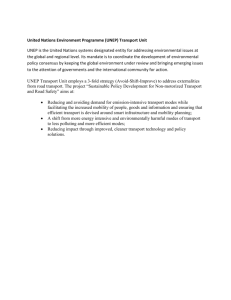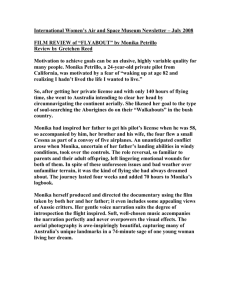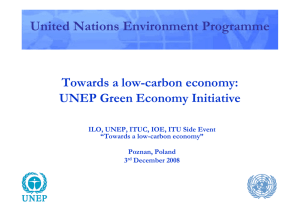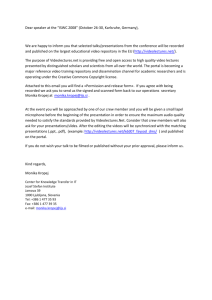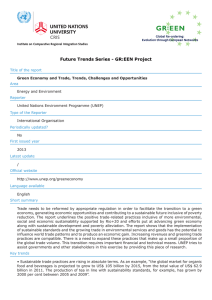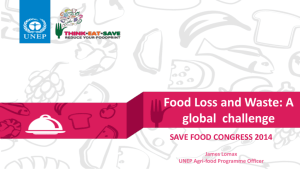MEETING AGENDA Introduction Objectives Provisional
advertisement
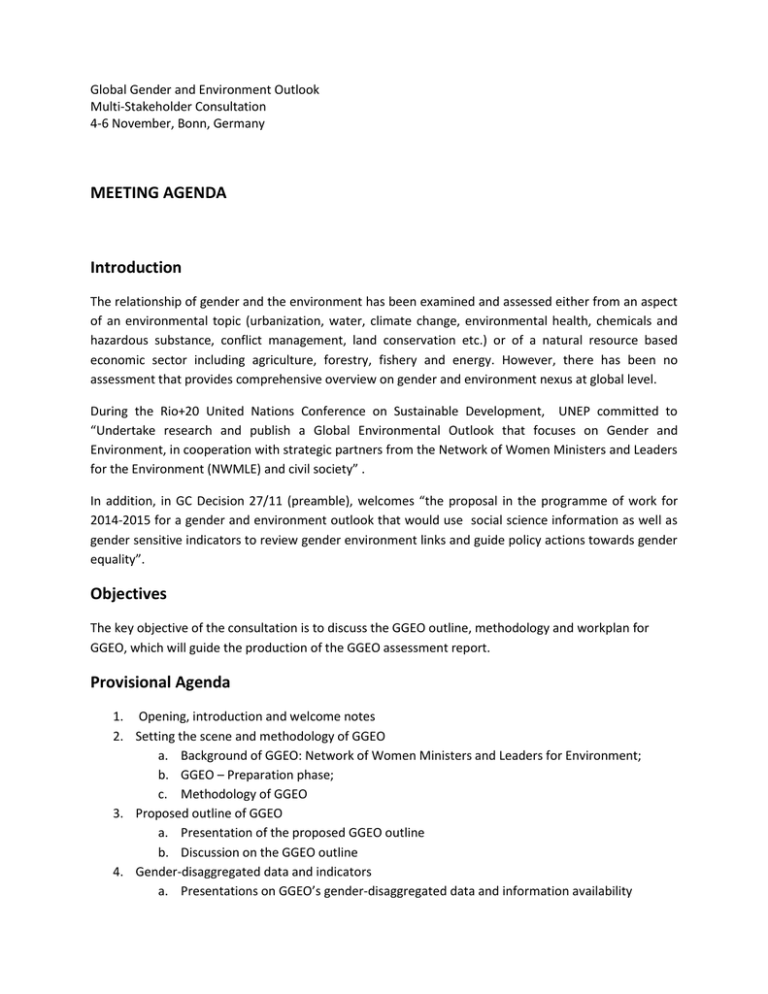
Global Gender and Environment Outlook Multi-Stakeholder Consultation 4-6 November, Bonn, Germany MEETING AGENDA Introduction The relationship of gender and the environment has been examined and assessed either from an aspect of an environmental topic (urbanization, water, climate change, environmental health, chemicals and hazardous substance, conflict management, land conservation etc.) or of a natural resource based economic sector including agriculture, forestry, fishery and energy. However, there has been no assessment that provides comprehensive overview on gender and environment nexus at global level. During the Rio+20 United Nations Conference on Sustainable Development, UNEP committed to “Undertake research and publish a Global Environmental Outlook that focuses on Gender and Environment, in cooperation with strategic partners from the Network of Women Ministers and Leaders for the Environment (NWMLE) and civil society” . In addition, in GC Decision 27/11 (preamble), welcomes “the proposal in the programme of work for 2014-2015 for a gender and environment outlook that would use social science information as well as gender sensitive indicators to review gender environment links and guide policy actions towards gender equality”. Objectives The key objective of the consultation is to discuss the GGEO outline, methodology and workplan for GGEO, which will guide the production of the GGEO assessment report. Provisional Agenda 1. Opening, introduction and welcome notes 2. Setting the scene and methodology of GGEO a. Background of GGEO: Network of Women Ministers and Leaders for Environment; b. GGEO – Preparation phase; c. Methodology of GGEO 3. Proposed outline of GGEO a. Presentation of the proposed GGEO outline b. Discussion on the GGEO outline 4. Gender-disaggregated data and indicators a. Presentations on GGEO’s gender-disaggregated data and information availability b. Discussion on data and information for GGEO preparation 5. Mainstreaming gender in development and environmental policies a. Presentations on Gender and environment policy and Gender and Sustainable Development Goals b. Discussion on mainstreaming gender in development and environmental policies 6. Process of GGEO a. Workplan and timetable b. Discussion on chapter contributions 7. Closure of the meeting Timetable 4 November 8.00 – 9.00 Participant registration Registration desk 9.00 – 9.10 Welcome and opening of meeting Ms. Janet Kabeberi-Macharia, Head, Gender and Social Safeguard Unit, UNEP 9.10 – 9.20 Welcome notes from H.E. Ms. Oyun Sanjaasuren, President of the First Session of the United Nations Environment Assembly, member of the NWMLE Video clip 9.20 – 9.30 Welcome notes from Director of UNEP’s Regional Office for Europe Mr. Wondwosen Asnake, Gender Coordinator of ROE, UNEP 9.30 – 9.45 Introduction of participations 9.45 – 10.00 Presentations on GGEO background and preparation phase Ms. Janet Kabeberi-Macharia 10.00 – 10.15 Presentation on the methodology of GGEO Ms. Monika MacDevette 10.15 – 10.45 Questions and answer 10.45 – 11.00 Tea/coffee break 11.00 – 11.30 Presentation on GGEO’s suggested outline 11.30 – 12.30 Discussion 12.30 – 13.30 Lunch break Ms. Monika MacDevette, Deputy Director, DEWA, UNEP 13.30 – 14.00 Presentations on Gender and environment policy and Gender and Sustainable Development Goals Expert presentation 14.00 – 14.15 Questions and answer 14.15 – 14.45 Presentation on mainstreaming gender in development and environmental policies at national and regional levels 14.45 – 15.00 Questions and answer 15.00 – 15.15 Tea/coffee break 15.15 – 16.45 Plenary discussion on mainstreaming gender into development and environmental policies Facilitated by experts 16.45 – 17.00 Presentations on GGEO’s underpinning genderdisaggregated data and information and GGEO Community of Practice Ms. Monika MacDevette 17.00 – 17.30 Discussion Expert presentation 5 November 9.00 – 9.15 Recap of day 1 Ms. Monika MacDevette 9.15 – 12.30 Parallel groups discussions: Facilitated by expert and governmental representatives Group 1: State, trends, impacts: issues related to data availability and policy relevance Group 2: Responses, outlook and policy recommendations: relevance to national policies, SDGs and post 2015 development agenda 12.30 – 13.30 Lunch 13.30 – 14.00 Group discussion report – Group 1 (Plenary session) 14.00 – 15.00 Discussion 15.00 – 15.15 Tea/coffee break 15.15 – 15.45 Group discussion report – Group 2 (Plenary session) 15.45 – 16.45 Discussion Group rapporteur Group rapporteur 16.45 – 17.30 Summary of the groups discussions regarding GGEO outline, methodology, data and indicators Ms. Monika MacDevette 9.00 – 9.15 Recap of day 2 Ms. Janet Kabeberi-Macharia, 9.15 – 10.30 Discussion on outreach opportunities of GGEO 10.30 – 10.45 Tea/coffee break 10.45 – 11.15 Presentation on the general principles of UNEP global assessment process and GGEO Workplan 11.15 – 12.30 Discussions on contributions to the chapters 12.30 – 13.00 Conclusions and closure of the meeting 13.00 – 14.00 Lunch 6 November Ms. Janet Kabeberi-Macharia Ms. Monika MacDevette and participants Meeting documents 1. GGEO Meeting Agenda 2. GGEO Background Paper 3. Global assessment process - Proposed procedures for enhancing future assessment processes (GEO6’s paper that is applicable for all UNEP global assessments) Meeting participants The meeting participants will include representatives from governments and agencies who are partners of the Network of Women Ministers and Leaders for the Environment. Participants from selected Major Groups as well as countries from geographically under-represented regions are also invited. Venue The meeting will be held at Derag Livinghotels Kanzler, Adenauerallee 148, 53113 Bonn, Germany.
